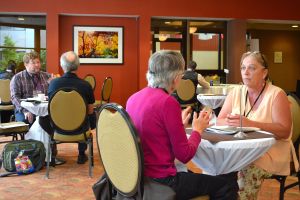 I’m in high-octane brain power mode this week. Practically twitchy, I’d say. I’m having a hard time focusing on one task for long, so let’s hope I finish this post before twitchy little authorial tasks such as plastering my new author photo everywhere or joining Google+ veer me away again. (Yeah, I know I poked fun at Google+ last week. Call me changeable.)
I’m in high-octane brain power mode this week. Practically twitchy, I’d say. I’m having a hard time focusing on one task for long, so let’s hope I finish this post before twitchy little authorial tasks such as plastering my new author photo everywhere or joining Google+ veer me away again. (Yeah, I know I poked fun at Google+ last week. Call me changeable.)
Why am I twitchy? I’m a debutante, donning my metaphorical tiara and pearls in honor of all debut authors everywhere! I was accepted at a debut author group blog called THE DEBUTANTE BALL with four other fabulous and feisty debut authors. We’re shaking things up! A new website design, new and interesting weekly topics, the works. We’re a mighty team, and we’ve virtually known each other only since Sunday. My brain is on overdrive with ideas.
The five us will be sharing our rollercoaster ride to publication with you, and we’ll also be helping each other out behind the scenes. Lots of moral support as we no doubt succumb to Author Overwhelmed Syndrome. (I stole this term from another great debut author group blog called BOOK PREGNANT. Thank you, Jessica Keener!)
So here we are, the debuting author debutantes of 2014 as introduced last weekend on The Debutante Ball. We start blogging in September.
 HEATHER WEBB: Author of BECOMING JOSEPHINE (Plume/Penguin, December 2013)
HEATHER WEBB: Author of BECOMING JOSEPHINE (Plume/Penguin, December 2013)
Heather grew up a military brat and naturally became obsessed with travel, culture, and languages. She put her degrees to good use teaching high school French for nearly a decade before turning to full time writing and editing.
As a freelance editor, Heather spends oodles of time helping writers find their voice and hone their skills–something she adores. She may often be found Twittering helpful links, sharing writing advice and author interviews on her blog Between the Sheets, or teaching novel writing in her community. Other favorite haunts are RomanceUniversity.org, where she contributes to the Editor’s Posts and Writer Unboxed where she poses as Twitter mistress.
 LISA ALBER, Author of KILMOON, A COUNTY CLARE MYSTERY (Muskrat Press, March 2014)
LISA ALBER, Author of KILMOON, A COUNTY CLARE MYSTERY (Muskrat Press, March 2014)
Lisa received an Elizabeth George Foundation writing grant based on Kilmoon, in addition to a Walden Fellowship. Her short story “Paddy O’Grady’s Thigh” appeared in Two of the Deadliest (HarperCollins), an anthology edited by New York Times bestseller Elizabeth George. In addition, Lisa was nominated for a Pushcart Prize for the story “Eileen and the Rock.”
A Californian with a penchant for travel, animal advocacy, and photography, Lisa worked in international finance and book publishing before exchanging the corporate ladder (no more business suits!) for storytelling. She currently lives in the Pacific Northwest with a one-eyed rescue spaniel and an accident-prone cat.
 SUSAN GLOSS, Author of VINTAGE (William Morrow/HarperCollins, March 2014)
SUSAN GLOSS, Author of VINTAGE (William Morrow/HarperCollins, March 2014)
Susan Gloss is a graduate of the University of Notre Dame, where she majored in English and Spanish, and the University of Wisconsin Law School. She lives on Lake Monona in Madison, Wisconsin, with her husband, young son, and a neurotic hound dog. She balances–-or attempts to, anyway–-writing and family time with working as an attorney, curating an online vintage shop at Etsy.com, and writing about food for Edible Madison magazine.
 NATALIA SYLVESTER: Author of CHASING THE SUN (New Harvest/Amazon Publishing, May 2014)
NATALIA SYLVESTER: Author of CHASING THE SUN (New Harvest/Amazon Publishing, May 2014)
Born in Lima, Peru, Natalia Sylvester came to the U.S. at age four and grew up in South Florida, where she received a B.A. in Creative Writing from the University of Miami. A former magazine editor, she now works as a freelance journalist and copywriter. Her articles have appeared in Latina, Writer’s Digest, and The Writer magazines. Chasing the Sun is partially inspired by a family member’s kidnapping. Natalia lives in Austin, Texas, with her husband and two rescue dogs, Maggie and Pita.
 LORI RADER DAY: Author of THE BLACK HOUR (Seventh Street Books, July 2014)
LORI RADER DAY: Author of THE BLACK HOUR (Seventh Street Books, July 2014)
Lori Rader Day won Good Housekeeping’s first short story contest, chosen by bestselling author Jodi Picoult, and the Chris O’Malley Prize in Fiction from The Madison Review. Lori muses on Twitter at @LoriRaderDay.




